大学英语形容词和副词专项讲解
- 格式:docx
- 大小:30.87 KB
- 文档页数:13
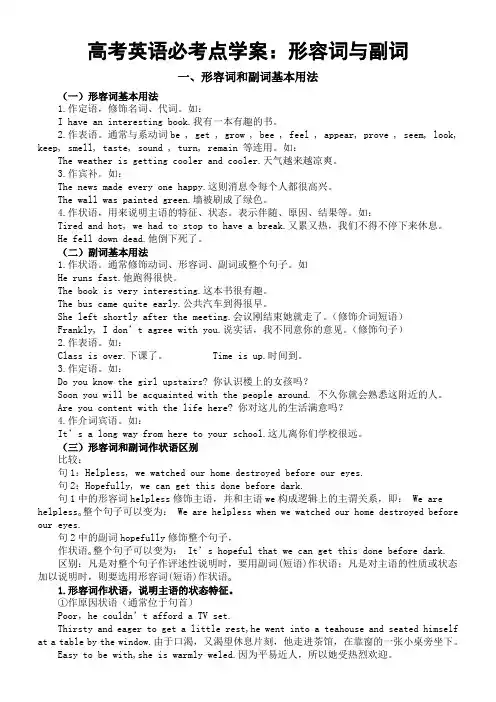
高考英语必考点学案:形容词与副词一、形容词和副词基本用法(一)形容词基本用法1.作定语,修饰名词、代词。
如:I have an interesting book.我有一本有趣的书。
2.作表语。
通常与系动词be , get , grow , bee , feel , appear, prove , seem, look, keep, smell, taste, sound , turn, remain 等连用。
如:The weather is getting cooler and cooler.天气越来越凉爽。
3.作宾补。
如:The news made every one happy.这则消息令每个人都很高兴。
The wall was painted green.墙被刷成了绿色。
4.作状语,用来说明主语的特征、状态。
表示伴随、原因、结果等。
如:Tired and hot, we had to stop to have a break.又累又热,我们不得不停下来休息。
He fell down dead.他倒下死了。
(二)副词基本用法1.作状语。
通常修饰动词、形容词、副词或整个句子。
如He runs fast.他跑得很快。
The book is very interesting.这本书很有趣。
The bus came quite early.公共汽车到得很早。
She left shortly after the meeting.会议刚结束她就走了。
(修饰介词短语)Frankly, I don’t agree with you.说实话,我不同意你的意见。
(修饰句子)2.作表语。
如:Class is over.下课了。
Time is up.时间到。
3.作定语。
如:Do you know the girl upstairs? 你认识楼上的女孩吗?Soon you will be acquainted with the people around. 不久你就会熟悉这附近的人。
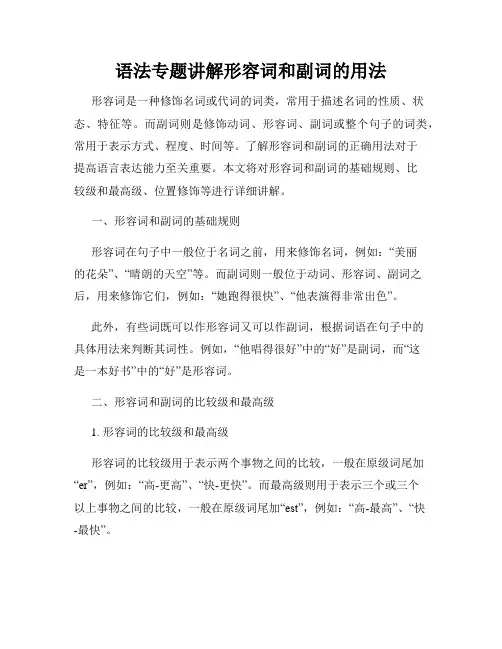
语法专题讲解形容词和副词的用法形容词是一种修饰名词或代词的词类,常用于描述名词的性质、状态、特征等。
而副词则是修饰动词、形容词、副词或整个句子的词类,常用于表示方式、程度、时间等。
了解形容词和副词的正确用法对于提高语言表达能力至关重要。
本文将对形容词和副词的基础规则、比较级和最高级、位置修饰等进行详细讲解。
一、形容词和副词的基础规则形容词在句子中一般位于名词之前,用来修饰名词,例如:“美丽的花朵”、“晴朗的天空”等。
而副词则一般位于动词、形容词、副词之后,用来修饰它们,例如:“她跑得很快”、“他表演得非常出色”。
此外,有些词既可以作形容词又可以作副词,根据词语在句子中的具体用法来判断其词性。
例如,“他唱得很好”中的“好”是副词,而“这是一本好书”中的“好”是形容词。
二、形容词和副词的比较级和最高级1. 形容词的比较级和最高级形容词的比较级用于表示两个事物之间的比较,一般在原级词尾加“er”,例如:“高-更高”、“快-更快”。
而最高级则用于表示三个或三个以上事物之间的比较,一般在原级词尾加“est”,例如:“高-最高”、“快-最快”。
如果原级词以“e”结尾,则只需在词尾加上“r”或“st”,例如:“large- larger- largest”。
而对于以一个辅音字母结尾的重读闭音节词,则要双写辅音字母,并加上“er”或“est”,例如:“big- bigger- biggest”。
2. 副词的比较级和最高级副词的比较级和最高级的构成与形容词的变化规则相似,一般在原级词尾加“er”或“est”,例如:“quickly- quicker- quickest”。
然而,有一些词的比较级和最高级是不规则的,例如:“well- better- best”、“badly- worse- worst”。
需要特别注意的是,有些词没有比较级或最高级,只能用原级形式表达。
例如,“unique”、“perfect”等词。
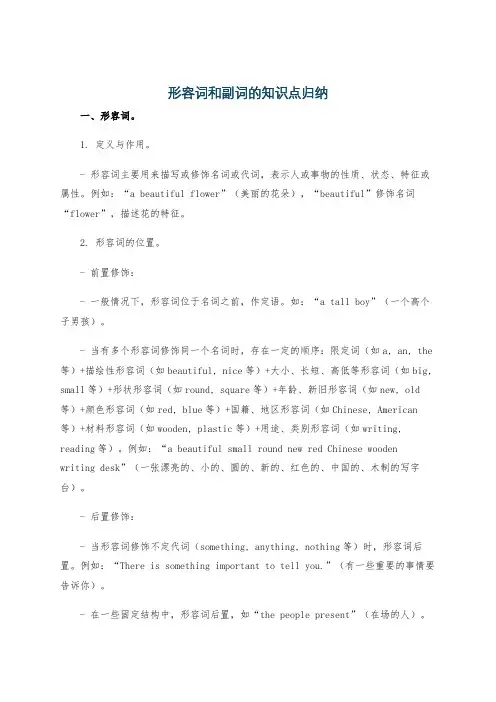
形容词和副词的知识点归纳一、形容词。
1. 定义与作用。
- 形容词主要用来描写或修饰名词或代词,表示人或事物的性质、状态、特征或属性。
例如:“a beautiful flower”(美丽的花朵),“beautiful”修饰名词“flower”,描述花的特征。
2. 形容词的位置。
- 前置修饰:- 一般情况下,形容词位于名词之前,作定语。
如:“a tall boy”(一个高个子男孩)。
- 当有多个形容词修饰同一个名词时,存在一定的顺序:限定词(如a, an, the 等)+描绘性形容词(如beautiful, nice等)+大小、长短、高低等形容词(如big, small等)+形状形容词(如round, square等)+年龄、新旧形容词(如new, old 等)+颜色形容词(如red, blue等)+国籍、地区形容词(如Chinese, American 等)+材料形容词(如wooden, plastic等)+用途、类别形容词(如writing, reading等)。
例如:“a beautiful small round new red Chinese woodenwriting desk”(一张漂亮的、小的、圆的、新的、红色的、中国的、木制的写字台)。
- 后置修饰:- 当形容词修饰不定代词(something, anything, nothing等)时,形容词后置。
例如:“There is something important to tell you.”(有一些重要的事情要告诉你)。
- 在一些固定结构中,形容词后置,如“the people present”(在场的人)。
3. 形容词的比较级和最高级。
- 规则变化:- 一般在词尾加 -er(比较级)和 -est(最高级)。
如:tall - taller - tallest。
- 以不发音的e结尾的单词,加 -r和 -st。
如:nice - nicer - nicest。
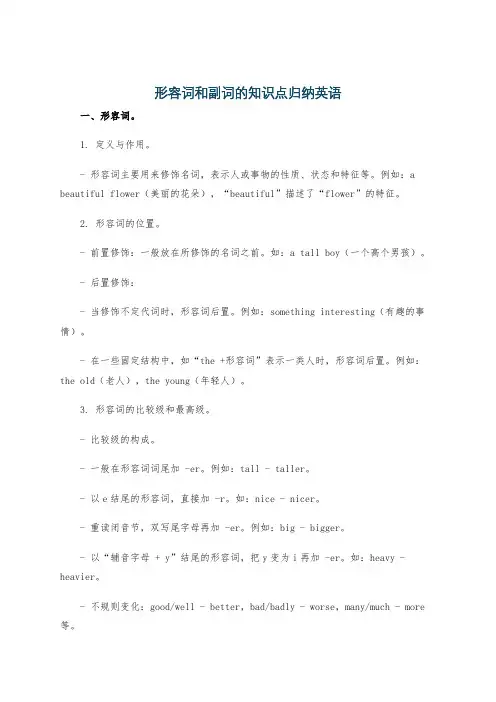
形容词和副词的知识点归纳英语一、形容词。
1. 定义与作用。
- 形容词主要用来修饰名词,表示人或事物的性质、状态和特征等。
例如:a beautiful flower(美丽的花朵),“beautiful”描述了“flower”的特征。
2. 形容词的位置。
- 前置修饰:一般放在所修饰的名词之前。
如:a tall boy(一个高个男孩)。
- 后置修饰:- 当修饰不定代词时,形容词后置。
例如:something interesting(有趣的事情)。
- 在一些固定结构中,如“the +形容词”表示一类人时,形容词后置。
例如:the old(老人),the young(年轻人)。
3. 形容词的比较级和最高级。
- 比较级的构成。
- 一般在形容词词尾加 -er。
例如:tall - taller。
- 以e结尾的形容词,直接加 -r。
如:nice - nicer。
- 重读闭音节,双写尾字母再加 -er。
例如:big - bigger。
- 以“辅音字母 + y”结尾的形容词,把y变为i再加 -er。
如:heavy - heavier。
- 不规则变化:good/well - better,bad/badly - worse,many/much - more 等。
- 最高级的构成。
- 一般在形容词词尾加 -est。
例如:tall - tallest。
- 以e结尾的形容词,直接加 -st。
如:nice - nicest。
- 重读闭音节,双写尾字母再加 -est。
例如:big - biggest。
- 以“辅音字母 + y”结尾的形容词,把y变为i再加 -est。
如:heavy - heaviest。
- 不规则变化:good/well - best,bad/badly - worst,many/much - most 等。
- 比较级和最高级的用法。
- 比较级用于两者之间的比较,常用结构有:A+be+形容词比较级+than + B。
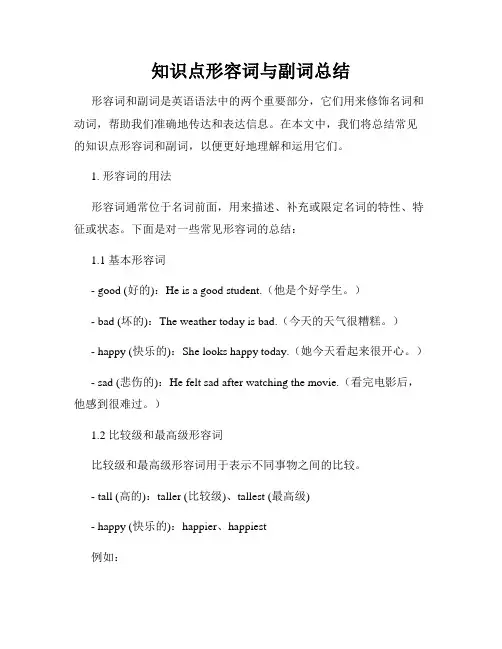
知识点形容词与副词总结形容词和副词是英语语法中的两个重要部分,它们用来修饰名词和动词,帮助我们准确地传达和表达信息。
在本文中,我们将总结常见的知识点形容词和副词,以便更好地理解和运用它们。
1. 形容词的用法形容词通常位于名词前面,用来描述、补充或限定名词的特性、特征或状态。
下面是对一些常见形容词的总结:1.1 基本形容词- good (好的):He is a good student.(他是个好学生。
)- bad (坏的):The weather today is bad.(今天的天气很糟糕。
)- happy (快乐的):She looks happy today.(她今天看起来很开心。
)- sad (悲伤的):He felt sad after watching the movie.(看完电影后,他感到很难过。
)1.2 比较级和最高级形容词比较级和最高级形容词用于表示不同事物之间的比较。
- tall (高的):taller (比较级)、tallest (最高级)- happy (快乐的):happier、happiest例如:- He is taller than his brother.(他比他的兄弟高。
)- She is the happiest person in the room.(她是房间里最快乐的人。
)1.3 泛指和特指形容词泛指形容词用于描述没有具体限制的事物,而特指形容词用于描述特定的事物。
- some (一些):He bought some apples.(他买了一些苹果。
)- this (这个):This book is interesting.(这本书很有趣。
)2. 副词的用法副词通常用来修饰动词、形容词或者其他副词,用来表达方式、时间、原因等。
2.1 副词修饰动词- slowly (慢慢地):He walks slowly.(他走得很慢。
)- quickly (快速地):She runs quickly.(她跑得很快。
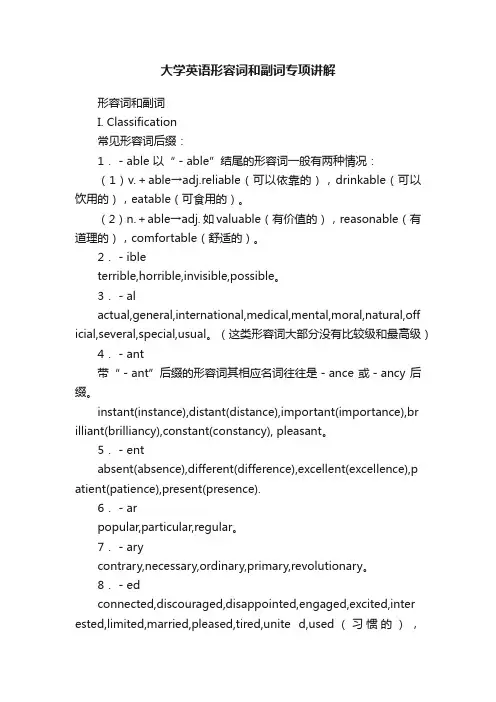
大学英语形容词和副词专项讲解形容词和副词I. Classification常见形容词后缀:1.-able 以“-able”结尾的形容词一般有两种情况:(1)v.+able→adj.reliable(可以依靠的),drinkable(可以饮用的),eatable(可食用的)。
(2)n.+able→adj. 如valuable(有价值的),reasonable(有道理的),comfortable(舒适的)。
2.-ibleterrible,horrible,invisible,possible。
3.-alactual,general,international,medical,mental,moral,natural,off icial,several,special,usual。
(这类形容词大部分没有比较级和最高级)4.-ant带“-ant”后缀的形容词其相应名词往往是-ance或-ancy后缀。
instant(instance),distant(distance),important(importance),br illiant(brilliancy),constant(constancy), pleasant。
5.-entabsent(absence),different(difference),excellent(excellence),p atient(patience),present(presence).6.-arpopular,particular,regular。
7.-arycontrary,necessary,ordinary,primary,revolutionary。
8.-edconnected,discouraged,disappointed,engaged,excited,inter ested,limited,married,pleased,tired,unite d,used(习惯的),worried,wounded。


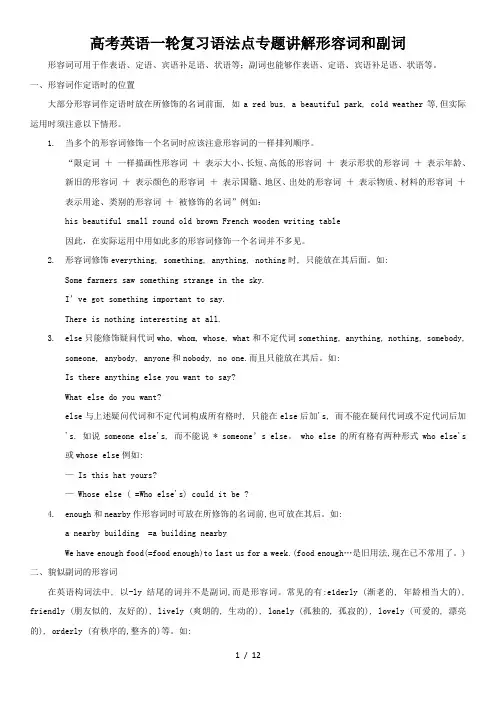
高考英语一轮复习语法点专题讲解形容词和副词形容词可用于作表语、定语、宾语补足语、状语等;副词也能够作表语、定语、宾语补足语、状语等。
一、形容词作定语时的位置大部分形容词作定语时放在所修饰的名词前面, 如a red bus, a beautiful park, cold weather等,但实际运用时须注意以下情形。
1.当多个的形容词修饰一个名词时应该注意形容词的一样排列顺序。
“限定词+一样描画性形容词+表示大小、长短、高低的形容词+表示形状的形容词+表示年龄、新旧的形容词+表示颜色的形容词+表示国籍、地区、出处的形容词+表示物质、材料的形容词+表示用途、类别的形容词+被修饰的名词”例如:his beautiful small round old brown French wooden writing table因此,在实际运用中用如此多的形容词修饰一个名词并不多见。
2.形容词修饰everything, something, anything, nothing时, 只能放在其后面。
如:Some farmers saw something strange in the sky.I’ve got something important to say.There is nothing interesting at all.3.else只能修饰疑问代词who, whom, whose, what和不定代词something, anything, nothing, somebody,someone, anybody, anyone和nobody, no one.而且只能放在其后。
如:Is there anything else you want to say?What else do you want?else与上述疑问代词和不定代词构成所有格时, 只能在else后加's, 而不能在疑问代词或不定代词后加's. 如说someone else's, 而不能说* someone’s else。
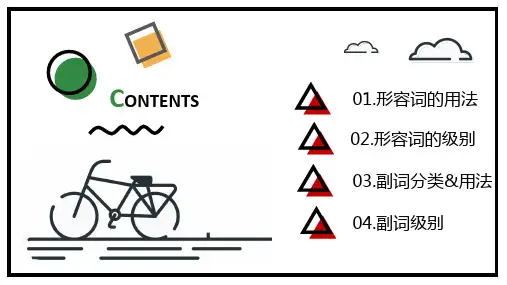
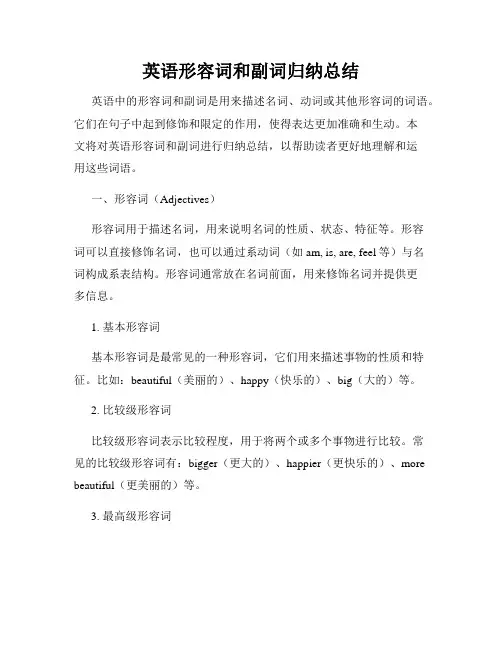
英语形容词和副词归纳总结英语中的形容词和副词是用来描述名词、动词或其他形容词的词语。
它们在句子中起到修饰和限定的作用,使得表达更加准确和生动。
本文将对英语形容词和副词进行归纳总结,以帮助读者更好地理解和运用这些词语。
一、形容词(Adjectives)形容词用于描述名词,用来说明名词的性质、状态、特征等。
形容词可以直接修饰名词,也可以通过系动词(如am, is, are, feel等)与名词构成系表结构。
形容词通常放在名词前面,用来修饰名词并提供更多信息。
1. 基本形容词基本形容词是最常见的一种形容词,它们用来描述事物的性质和特征。
比如:beautiful(美丽的)、happy(快乐的)、big(大的)等。
2. 比较级形容词比较级形容词表示比较程度,用于将两个或多个事物进行比较。
常见的比较级形容词有:bigger(更大的)、happier(更快乐的)、more beautiful(更美丽的)等。
3. 最高级形容词最高级形容词表示某一事物在数量或质量上达到最高程度。
常见的最高级形容词有:the biggest(最大的)、the happiest(最快乐的)、the most beautiful(最美丽的)等。
二、副词(Adverbs)副词用于修饰动词、形容词、副词或整个句子,用来说明一种动作的方式、程度、时间、频率等。
副词的作用是使句子更加准确和详细。
1. 基本副词基本副词是最常见的一类副词,它们一般以-ly结尾,并用来修饰动词或形容词。
例如:quickly(快速地)、happily(快乐地)、carefully (小心地)等。
2. 程度副词程度副词用来表示动作或状态的强度或程度。
常见的程度副词有:very(非常)、too(过于)、extremely(极其)等。
3. 时间副词时间副词用来描述动作发生的时间或频率。
常见的时间副词有:often(经常)、always(总是)、sometimes(有时候)等。
形容词和副词是英语中重要的词类,它们用于描述和修饰名词、动词和其他形容词或副词。
形容词和副词通常通过改变词尾或使用不同的词根来进行构词,具有丰富多样的用法。
本文将详细解释英语中形容词和副词的用法,帮助读者更好地理解和运用。
首先,形容词通常用于描述和修饰名词,使句子更加生动和具体。
形容词有三种常见的位置:前置形容词、后置形容词和后置的短语形容词。
前置形容词通常出现在名词前面,用于直接修饰名词。
例如,“beautiful flowers”(美丽的花朵)中的“beautiful”就是一个前置形容词。
前置形容词通常用来表示主观评价,情感或观点等。
此外,有一些常见的多词形容词,称为“连接形容词”,例如“blue-eyed”(蓝眼睛的)和“high-speed”(高速的)。
这些多词形容词用连字符连接起来成为一个整体。
后置形容词出现在名词后面,通常由系动词“be”引导,用于进一步描述名词。
例如,“The car is red”(这辆车是红色的)中的“red”就是一个后置形容词。
后置形容词通常用于表示客观事实或属性。
后置短语形容词是由介词加上名词短语构成的形容词短语,出现在名词后面。
例如,“the man in the blue shirt”(穿蓝衬衫的男人)中的“in theblue shirt”就是一个后置短语形容词。
后置短语形容词通常用于描述名词的特定特征和背景。
而副词则用于修饰动词、形容词和其他副词,具有更加广泛的用法。
副词有四种常见的位置:前置副词、后置副词、句首副词和句尾副词。
前置副词出现在动词或形容词之前,用于进一步描述其程度或方式。
例如,“He ran quickly”(他跑得很快)中的“quickly”就是一个前置副词。
前置副词通常用来修饰动作或状态的方式和程度。
后置副词出现在动词或形容词之后,用于进一步描述其程度或方式。
例如,“She speaks English fluently”(她流利地讲英语)中的“fluently”就是一个后置副词。
形容词和副词I. Classification常见形容词后缀:1.-able 以“-able”结尾的形容词一般有两种情况:(1)v.+able→adj.reliable(可以依靠的),drinkable(可以饮用的),eatable(可食用的)。
(2)n.+able→adj. 如valuable(有价值的),reasonable(有道理的),comfortable(舒适的)。
2.-ibleterrible,horrible,invisible,possible。
3.-alactual,general,international,medical,mental,moral,natural,official,several,special,usual。
(这类形容词大部分没有比较级和最高级)4.-ant带“-ant”后缀的形容词其相应名词往往是-ance或-ancy后缀。
instant(instance),distant(distance),important(importance),brilliant(brilliancy),constant(constancy), pleasant。
5.-entabsent(absence),different(difference),excellent(excellence),patient(patience),present(presence).6.-arpopular,particular,regular。
7.-arycontrary,necessary,ordinary,primary,revolutionary。
8.-edconnected,discouraged,disappointed,engaged,excited,interested,limited,married,pleased,tired,unite d,used(习惯的),worried,wounded。
9.-en(1)“-en”跟在一些物质名词之后构成形容词,表示“材料”或“质地”,如wooden,golden,earthen。
(2)“-en”也可加在一些不规则动词之后形成形容词。
这些形容词实际上是由过去分词转换而来的。
例如:spoken,written,stricken,mistaken。
10 -ern,加在表示方位的名词之后,表示“……(方位)的”。
eastern,southern,western,northern等。
11.-ese,加在国名、地名之后构成相应形容词。
例如:Chinese,Japanese.12.-ful 这一后缀有两种情况:(1)加在名词之后,表示“充满……的”、“有……性质的”,如beautiful,colourful,helpful,powerful,successful,useful,wonderful。
(2)加在动词之后,所构成的形容词意为“易于……的”,如forgetful,regretful13.-ic 常常加在名词或依附于词干后,意为“……的”、“……似的”、“ 与……有关的”等。
Atlantic,electric,arctic,historic,pacific,plastic,public,scientific。
14.-ical,同“ic”一样附加在名词或词干后构成形容词,意为“……的”、“……似的”、“与……有关的”,如physical,political,practical,technical等。
注:(1)有些形容词的词尾可能是“-ic”和“-ical”并存,且可以互相替代,但有时也有区别。
一般来说,词尾“ic”与词根的关系比较密切,而词尾“ical”与词根的关系比较含糊,一般作“与……有关的”解。
an electric light(电灯),electrical engineering(电气工程);historic意为“历史上有名气的”,historical则意为“关于历史的”。
(2)以“ic”结尾的形容词,其相应副词则往往是pacifically,scientifically。
15.-ing 例如:dying,exciting,inspiring,interesting,freezing,living。
16.-ist “-ist”表示“……主义的”、“信仰……的”。
该后缀加在名词之后,communist,imperialist,Marxist,socialist。
17.-ive 意为“……的”、“与……有关的”、“具有……性质的”等。
native,active,passive,attentive,expensive。
18.-less “-less”加在名词、动词后,表示“无”、“缺”,fearless,harmless,useless,helpless,careless。
19.-ly加在名词之后构成形容词。
这一词缀的意义有二:(1)“像……的”、“有……性质的”friendly,lively,lovely,lonely,orderly。
(2)“以……为周期的”、“每……的”hourly,daily,weekly,monthly,yearly。
20.-(i)ous 意为“充满……的”、“具有……特征的”,加在名词、动词和形容词之后。
curious,famous,dangerous,obvious,poisonous,serious,various。
21.-some 加在名词、动词之后,表示“使人……的”、“易于……的”,handsome,troublesome,tiresome。
22.-ward, 加在名词之后,表示方向,作“向……(方向)的”、“来自……(方向)的”解。
eastward,southward,westward,northward,forward,backward,inward,outward,upward,downward。
注:这些词也可以是副词。
如果词尾是“-wards”时,必然是副词。
23.-y, 加在名词之后,表示“具有……特征的”、“多……的”。
funny,lucky,shabby,snowy,thirsty,windy,sunny,rainy,cloudy,dirty,dusty。
介词形容词1)abovethe above sentence 或the sentence above(上面的)2)outsidean outside door (外边的) , an outside wrapping (外包装)3)inThat s the in place to go now . (时髦的)an in door(朝里面的) , the in party(执政的)4)insideFor inside circulation only . (内部的)the inside front( back) (书等)封面(底)的背面(里面的)5) downfeel down about sth . (沮丧的)6)offoff hours(业余时间的) , an off season(不佳的) , feel off(不舒服的) , an off chance (极小的)复合形容词hand-made 手工的new-born 新生的deaf-mute 聋哑的absent-minded 漫不经心的合成形容词1)名词+ 形容词(形容词+ 名词)ice-cold snow-white, world-wide, fire-proof, home-sick2)名词(代词) + 名词+ -edchicken-hearted apple-shaped silver-haired3)名词(代词) + 现在分词time-consuming labor-saving freedom-loving trouble-making 4)名词(代词) + 过去分词snow-covered self-taughthand-written air-conditioned5)形容词(数词) + 名词second-hand first-class deep-sea part-timea three-hour flight a three-pound chickena two-hundred-metre bridge a five-hundred-word letter6)形容词(数词) + 名词+ -edgood-mannered bad-tempered open-minded kind-hearted 7)形容词+ 现在分词good ( nice)-looking easy-going8)形容词+ 过去分词(有些也可看作是副词+ 过去分词)new-built new-born9)副词+ 形容词all-round ever-green10)副词+ 现在分词ever-lasting out-going hard-working far-seeing11)副词+ 过去分词well-known well-behaved badly-wounded much-needed 12)动词(或过去分词) + 副词II functions1.作定语只能用作前置定语I have the utmost respect for her accomplishments.以-er 结尾的形容词, 如: elder ( eldest) , inner, other, upper, lower , latter, former , outer , hinder , utter , lesser(也包括daily, weekly 等)。
Her elder brother his former wife his weekly pay-en 结尾的形容词, 如: wooden, golden, woolena wooden table, a golden watch, a woolen sweater只能用作后置定语a-形容词afraid, asleep, alone, awake, alive, ashamedHe is the only man awake at that time .He is the only man alive in the village after the earthquake .修饰不定代词时something new nothing interestinganybody present everything good形容词短语Have you found a man suitable for the work ?-able,-ible结尾的形容词available,imaginable, possible ,visibleThere are plenty of jobs available in the area.Parents encourage every activity imaginable.前置或后置都可以a 300-metre high buildinga building 300-metre higha difficult job to doa job difficult to doa more complicated problem than the previous onea problem more complicated than the previous oneso good a chance as not to be misseda chance so good as not to be missed2.只作表语的形容词well, worth, liable, subject, content, bound, ill, sunk, drunk, sure, unable 等词The film is worth seeing .H e is well .H e is a well man . (误)She is ill( sick) . (正)She is a sick person . (正)She is an ill person . (误)ill 作“ 有害的,不好的”解时, 可用作前置定语, 如ill luck , ill wind , ill news英语中有些形容词, 既可作定语, 也可作表语, 但表示的意思往往不同。